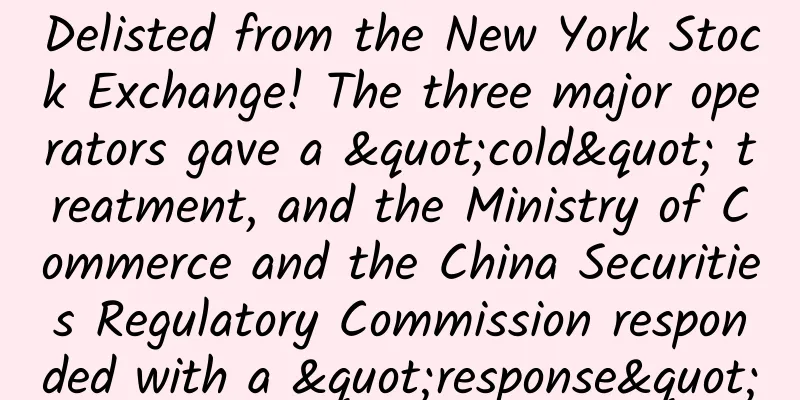Delisted from the New York Stock Exchange! The three major operators gave a "cold" treatment, and the Ministry of Commerce and the China Securities Regulatory Commission responded with a "response"

|
Affected by the New York Stock Exchange's decision to delist China's three major operators, the Hong Kong stocks of the three major operators all fell at the opening on the first trading day after the New Year. Among them, China Telecom once fell by 5%, China Mobile once fell by more than 4%, and China Unicom once fell by about 3.5%. In response to this matter, on January 4, 2020, the three major operators responded one after another, stating that they had not received any notification from the New York Stock Exchange's delisting decision. At the same time, all three companies expressed regret over the New York Stock Exchange's decisions and actions. Response from the three major operators On December 31, 2020 (local time in the United States), the New York Stock Exchange (NYSE) issued a statement announcing that it has decided to initiate the delisting process for China's three major telecom operators. On January 4, the three major operators separately issued announcements on the Hong Kong Stock Exchange, saying that they had noticed that the staff of the New York Stock Exchange's regulatory department had decided to initiate delisting procedures for the securities of three issuers, including the company's American depositary shares. But at the same time, all three operators pointed out that they had not yet received any notification from the New York Stock Exchange regarding the decision to delist their American depositary shares. According to the NYSE announcement, the specific delisting time will be between January 7 and January 11, 2021. In other words, no matter what, the NYSE will terminate the stock trading of the above three companies before 4 a.m. on January 11, 2021. As for the specific process, China Telecom mentioned it in the announcement:
Leifeng.com learned that China Mobile was listed in the United States in 1997 with the stock code CHL; China Unicom was listed in the United States in 2000 with the stock code CHU; China Telecom was listed in the United States in 2002 with the stock code CHA. However, in addition to being listed on the New York Stock Exchange, China Unicom, China Telecom and China Mobile are also listed in Hong Kong, and their revenue basically comes from China. In the United States, apart from being listed on the New York Stock Exchange, they have basically no presence - therefore, Bloomberg stated that the NYSE's delisting of these three companies has more symbolic significance than practical significance. This is more like a signal. Chinese companies face severe challenges It can be learned from the official statement that the management of the New York Stock Exchange made the above decision because of the executive order (Executive Order 13959) signed by US President Trump on November 12, 2020. The executive order stipulates that starting at 9:30 a.m. Eastern Time on January 11, 2021, any U.S. entity is prohibited from purchasing publicly issued securities, derivative securities and other financial products of so-called "Chinese military-related enterprises." It is understood that Section 1237 of the U.S. National Defense Authorization Act (NDAA) for Fiscal Year 1999 stipulates that the list of so-called "Chinese military-related enterprises" should be announced by the U.S. Secretary of Defense after consultation with the Secretary of Justice, the Director of the Central Intelligence Agency and the Director of the Federal Bureau of Investigation. So far, many Chinese companies have been included in the above list, including large state-owned enterprises or central enterprises, as well as Huawei, SMIC, etc. Of course, China’s three major telecom operators have already been included in the above list in batches. Based on the above-mentioned background, the New York Stock Exchange stated that China's three major operators are no longer suitable to appear in the U.S. securities market, so it decided to delist them. However, the delisting of the three major operators may just be the beginning. The Wall Street Journal reported that other US measures may also cause Chinese companies to be delisted from US exchanges, including the Foreign Companies Accountability Act signed by Trump in December 2020. It is worth noting that after Trump signed it, the bill has officially become US law. Leifeng.com learned that there is a core clause in the "Foreign Companies Accountability Act": If a company cannot prove that it is not controlled by a foreign government, or the U.S. Public Company Accounting Oversight Board (PCAOB) is unable to audit it for three consecutive years, the company's securities will be banned from trading on U.S. exchanges. In other words, this bill actually requires Chinese companies listed in the United States to be subject to three consecutive years of review by the PCAOB; and many Internet companies including Alibaba, JD.com, Pinduoduo and others are listed in the United States. It is not difficult to imagine that Chinese companies will face even more severe challenges in the future in the United States. The Ministry of Commerce and the China Securities Regulatory Commission jointly spoke out Just two days after the United States announced its decision to delist the three major operators, on January 2, the spokesperson of the Ministry of Commerce expressed his views on the matter: This practice of abusing national security and using state power to suppress Chinese companies is inconsistent with market rules and violates market logic. It not only damages the legitimate rights and interests of Chinese companies, but also damages the interests of investors from various countries including the United States, and will seriously undermine the confidence of all parties in the U.S. capital market. At the same time, the Ministry of Commerce also stated that China will take necessary measures to resolutely safeguard the legitimate rights and interests of Chinese companies. On January 3, the day after the Ministry of Commerce issued its position, the China Securities Regulatory Commission also expressed its views on the matter, also pointing out that the US move undermined normal market rules and order. The spokesperson of the China Securities Regulatory Commission said:
The NYSE's direct announcement of the delisting of three companies was triggered by the US government's executive order against so-called "military-related companies." The US implemented the executive order for political purposes, completely ignoring the actual situation of the relevant companies and the legitimate rights and interests of global investors, and seriously undermined normal market rules and order. At the same time, the CSRC also expressed its support for the three companies to safeguard their own rights and interests in accordance with the law, and believed that they would be able to properly deal with the adverse effects caused by administrative orders and delisting measures. As for the impact of being delisted, the spokesperson of the China Securities Regulatory Commission also mentioned:
However, it should be pointed out that although the delisting has limited direct impact on the development and market operation of the three major operators, it reflects deeper meanings behind it. As Felix Salmon, author of the American media website Axios, said:
This article is reproduced from Leiphone.com. If you need to reprint it, please go to Leiphone.com official website to apply for authorization. |
<<: Promoting the integrated development of 5G and industrial Internet
Recommend
Hou Jinlong, President of Huawei Cloud and Computing BG: Build Industry Intelligence and Jointly Construct All-Scenario Intelligence
Today, at HUAWEI CONNECT 2020, Hou Jinlong, Presi...
Wi-Fi 6 is here, are you interested?
If we were to vote for the "hottest names&qu...
Why TCP will be replaced by UDP
Why's THE Design is a series of articles abou...
What exactly is 5G security and why is it important?
New technologies always bring with them a lot of ...
How can 5G fixed wireless access replace fiber optic access to the last mile?
[[180048]] Verizon, a US operator, announced that...
What exactly is “5G New Call”?
In today’s article, let’s talk about a very popul...
DiyVM: Hong Kong CN2 line VPS 50% off, 2G memory package monthly payment 50 yuan
The tribe often shares information about DiyVM. T...
Connecting the Next Billion: 5G and Satellite
5G will revolutionize the Internet of Things due ...
Let's talk about three kinds of custom networks in Docker (bridge, macvlan, overlay)
Docker provides a variety of network drivers, all...
Detailed explanation: How did China Mobile perform in 2020?
[[390976]] Compared with China Telecom and China ...
Zhang Hao from Ele.me: A food delivery guy sent by AI
[51CTO.com original article] On July 21-22, 2017,...
Enterprises want to formalize WFH network architecture
Enterprises are transforming their networks to be...
CloudCone Easter Promotion: $15/year KVM-1GB/30GB/3TB/Los Angeles Data Center
CloudCone offers three special VPS packages for t...
Fiber-optic interconnects: How to improve cloud computing networks
Since the beginning of the 21st century, cloud co...
Artificial intelligence accelerates industrial innovation and upgrading. How should network infrastructure respond?
In today's digital economy era, digital trans...





![[Black Friday] HawkHost virtual hosts up to 35% off, reseller hosts/cloud servers up to 30% off](/upload/images/67cac23f66265.webp)



